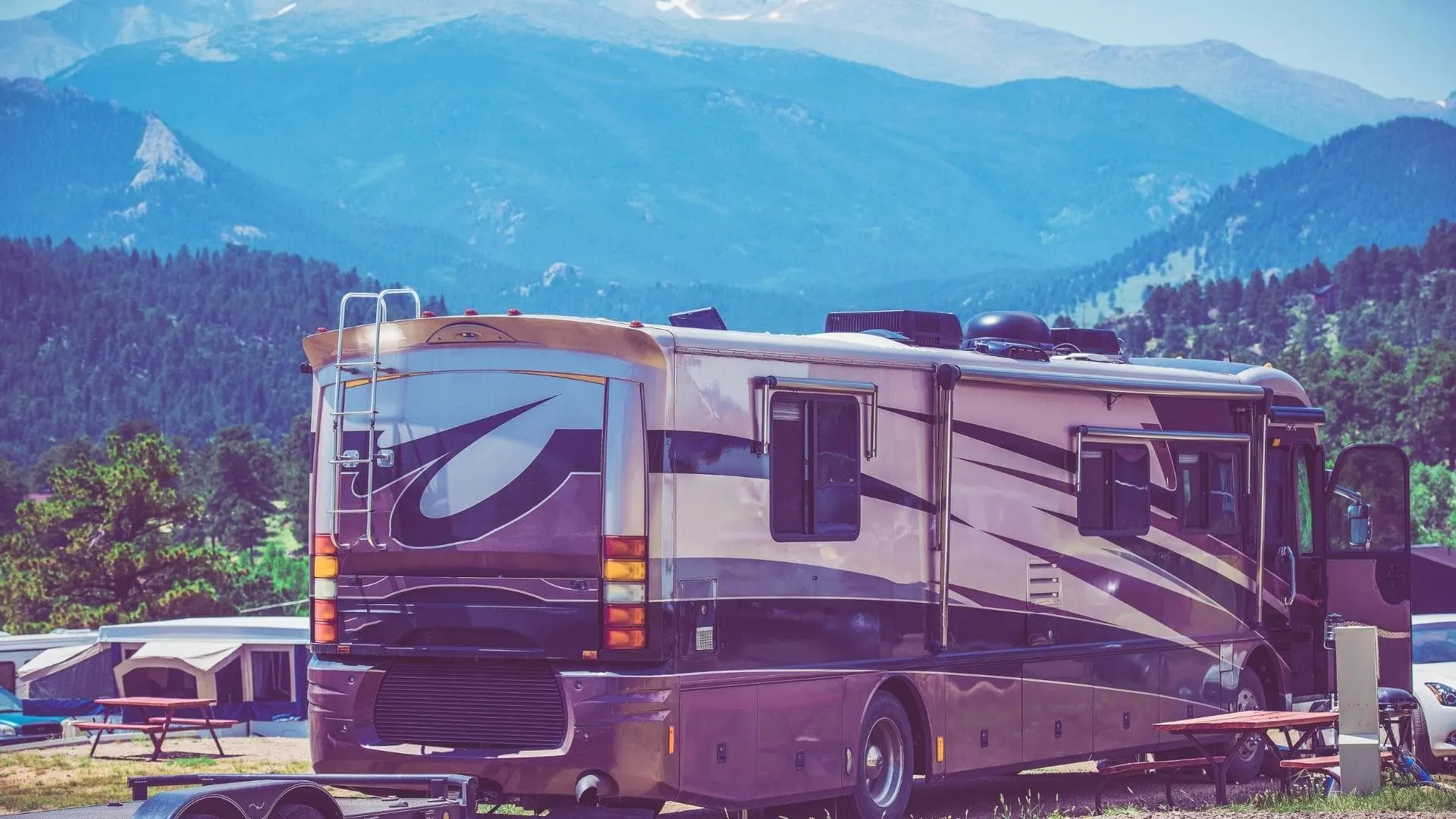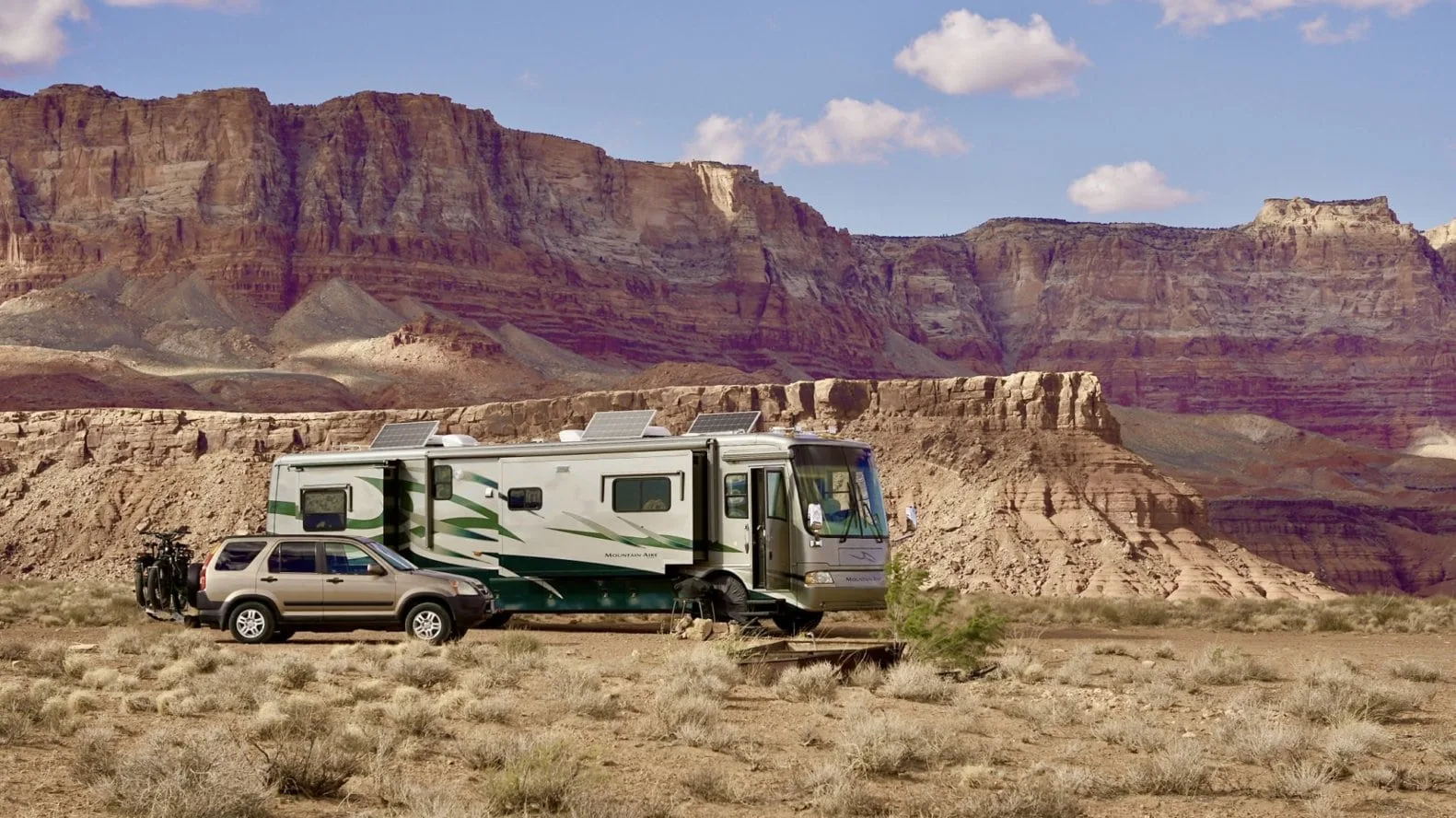We’ve all heard the term “big rig” tossed around from time to time, and those of us in the RV community have often heard the term “big rig RV” and we’ve seen RV parks and campgrounds described as having “big rig access”.
But what exactly constitutes a “big rig RV”? And what does “big rig access” really mean?
We’ll answer these questions and a whole lot more in today’s post all about big rig RVs. Let’s go!
What Is a Big Rig RV?
Essentially, a big rig RV is classified as any RV over 40’ long. Regardless of the type of RV (motorhome, 5th wheel, etc.), if your rig is over 40’ in length, you’ve got yourself a “Big Rig”.
If you’ve got a big rig RV, you’ve got lots of living space, and you’ve also got to consider a few things owners of smaller rigs don’t have to think about – like navigating city streets, your turning radius, merging in traffic, etc.
You also need to carefully consider the size of your campsite and how to move in and out of it. This is why owners of large RVs search for campsites with “big rig access”. (You may also see the term “big rig friendly” used to describe campsites.)
What Does “Big Rig Access” Mean?
“Big rig access” is a term used to describe the approach to a campsite that large RVs should be able to access. While a campsite may be “big rig friendly” and thus wide enough and long enough to accommodate your RV, if the approach to the campsite requires maneuvering through tight, narrow twists and turns, around trees and large rocks, under low hanging branches, requiring masterful three-point turns to back into a site, then you’re not going to get your big rig RV into that campsite without risking damage to your rig.

The term “big rig access” should indicate that big rig RVs will be able to pull into and out of the campground and navigate the campsite in a large RV, but the term is somewhat subjective so consulting real-world reviews is essential.
So “big rig access” is supposed to mean that you’ll be able to approach the campsite and pull in or back in as needed, safely.
But hear us out:
Just because a campsite or RV park advertises a site or sites as having “big rig access”, there are a couple of extra steps it makes sense to take every single time you plan your camping trip.
1. Always read reviews from other owners of large RVs who have accessed the campsite before to get a sense of the reality of the situation. Again, a campground owner or marketer can measure a site and determine that adding the phrase “big rig access” is sensible because the site will accommodate a 43-foot diesel pusher like ours. But if it’s tough to maneuver the rig to the campsite without risking damage to a large RV, you may not want to be there.
2. Walk to the site before driving to the site. When we arrive at a campsite, we’ll pull the rig over and walk the route we’ll have to drive to get our big rig into the site. We walk the route before we drive it (or scope it out from our easy-to-maneuver toad car). This is the best way to prevent yourself from getting into a situation that could not only damage your rig but could also be difficult to get out of once you’re in there.
What Is the Biggest RV Size?
Generally speaking, Class A RVs are the largest RVs on the road, though there are also very large Super C RVs and fifth wheels that top out between 40 and 45 feet that are most definitely “big rigs”!

Our Newmar Mountain Aire Class A Diesel Pusher is 43′ long and is considered a big rig RV.
But there are also some extremely large, custom-made big rigs out there as well.
Rumor has it that Will Smith is the proud owner of a big rig RV with 1,200 square feet of living space. That’s a pretty big rig! For reference, the rig has 14 televisions (including a 100-inch roll-down movie screen in a 30-person screening room), is two stories tall, 55-feet long, has 22 wheels, and is essentially a yacht on wheels.
But Will Smith’s 55’ land yacht, behemoth though it is, appears small in terms of length (and only length) next to the Powerhouse Ultra Line Coach, a rig that stretches to 122 feet long with its two separate RV cabins (one towing the other).
Again, these rigs are custom-made.
But the longest Class A motorhomes on the market are 45’ long. Manufacturers such as Newmar and Entegra make several 45’ models. Other big forty-five-footers include bus conversions, often built on Prevost chassis.
What Is the Biggest RV You Can Rent?
Why, it’s Will Smith’s rig, of course! You can rent Will’s big rig RV for a mere $9,000 a week. ????
But, seriously, just about any length RV is available for rent via the many peer-to-peer rental platforms like RVnGo, RVshare, Outdoorsy, RVezy, etc. From “big rig” to small, they pretty much offer them all (sorry, didn’t mean to rhyme… it just happened).
Are Big Rig RVs Considered Class A RVs?
Some custom-made RVs that are pulled by tractor-trailers are in a class all their own. But in terms of traditional RV classes, a typical big rig RV is most often a Class A Diesel Pusher (though, as mentioned above, there are 40+ foot fifth wheels and Super C Rvs that also earn the title).
But, while a big rig RVs could be a Class A RV, not all Class A RVs are big rigs! (There are some Class A RVs that are barely over 24 feet long. Check out our post entitled “5 Awesomely Small Class A Motorhomes”.)
If you’re interested in learning more about Class A RVs in general, feel free to have a look at our post entitled “How Big Is a Class A Motorhome? Everything You Need to Know About Class A RVs”.
Geek Out With Us Every Week
Join our newsletter to learn about all things RV-related. Every week we offer free tips, tricks, product reviews, and more to our online community of RVers. So, whether this is your first time on the road or you’re a seasoned expert, we’d love for you to geek out with us!


Al Barrios
Sunday 1st of January 2023
You guys have checked out Super C style motorhomes, but never mention them in articles like this one. There are many Super C's manufactured, and are equally "High End" to any class A motorhome! How about a little love us people that prefer a real "Big Rig" style motorhome!
TheRVgeeks
Sunday 1st of January 2023
Fair enough, Al! We’ll keep that in mind for upcoming articles.????
Gay Camping Enthusiast
Sunday 2nd of January 2022
Hey Peter. Hey John. I hope you had a fun Christmas and a fun New Year. I love your You Tube videos and your email posts regarding RVing. I find them informative and entertaining.
You talk about large RVs, that's anything from large (30' or larger Class A motorhomes to 30'+ travel trailers, to toy haulers, etc. I'm not against the thought of a 30' to 40' motorhome, particularly if you intend to live in it full-time, and or work in it, using the rig for work, and that's all well and good. But I'm wondering what, if anything there is regarding smaller RVs, for those who are either part-time RVers, or they're newbie RVers, who want to start out small, say between 20' and 30', who neither want, nor need a "Big Rig" RV. Any suggestions? Thanks!
Jason
TheRVgeeks
Sunday 2nd of January 2022
Hey Jason! We did indeed have a nice holiday. Thanks very much. Hope you did, too. We're going to go with our standard advice for ALL RVers: "Buy the smallest rig you think you can be comfortable in." We didn't follow that advice ourselves, but have known for a long time now that we would have been better off if we'd gone for something like a 35' rig, even for full-timing. That doesn't mean Class A rigs aren't still a consideration, so we included a link in this article to our previous post about smaller class A RVs.